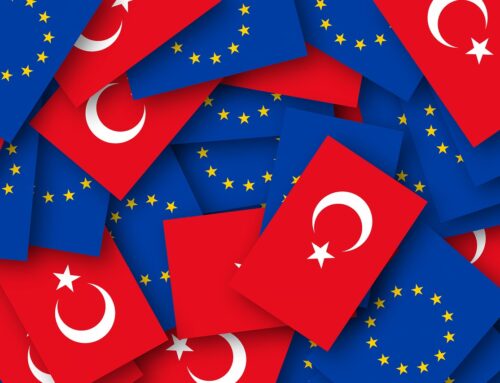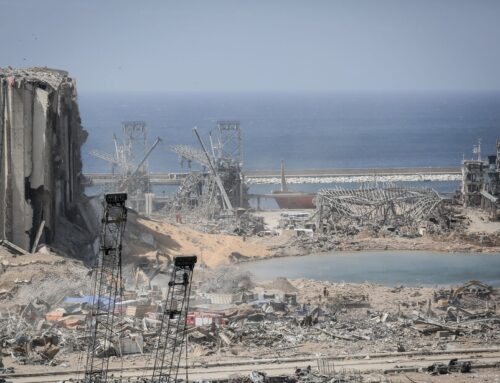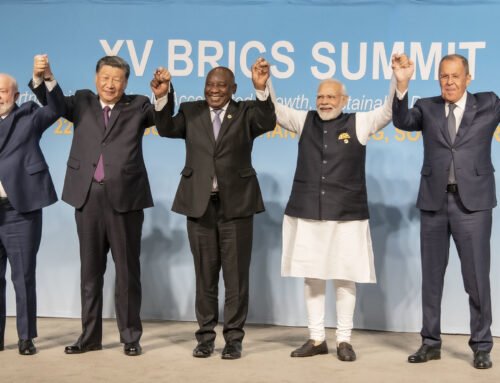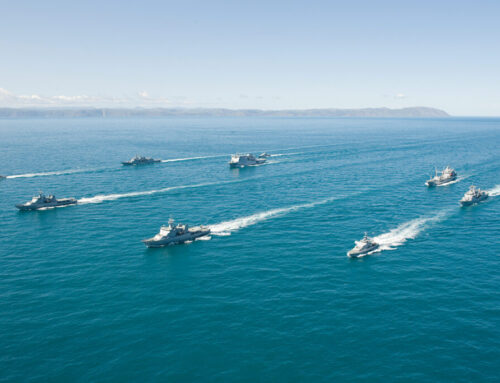russia_iran_alliance
Autor foto: Domena publiczna
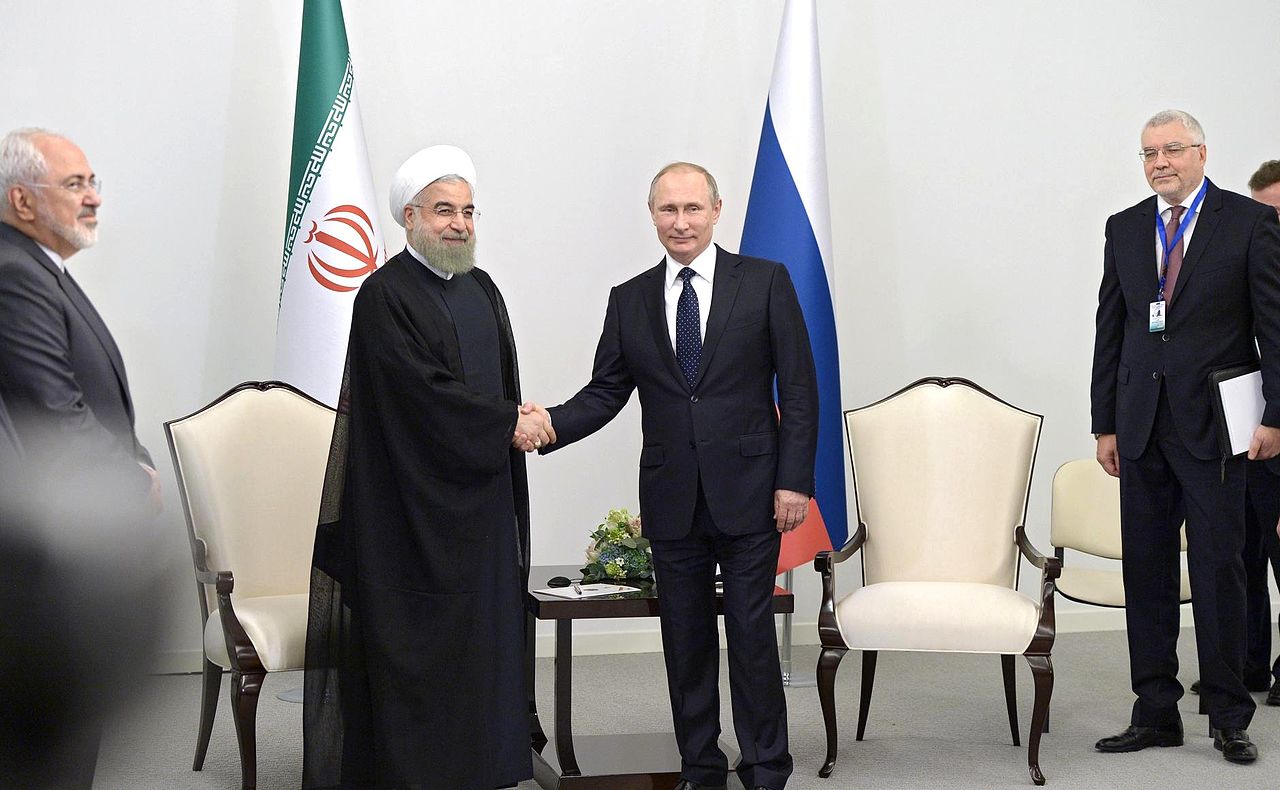
Iran, Russia, Turkey: A New Middle Eastern Trio?
October 10, 2016
Author: Jakub Gajda


russia_iran_alliance
Autor foto: Domena publiczna
Iran, Russia, Turkey: A New Middle Eastern Trio?
Author: Jakub Gajda
Published: October 10, 2016
A turnaround in Russian-Turkish relations has become the main topic of discussion and source of concerns for Western countries for several weeks. A thaw in relations between these two countries is accompanied by another actor that can strengthen the construction of anti-Western bloc in the Middle East. This actor is Iran which is striving for supremacy in the region of Middle East and the Islamic world. Iran is putting pressure on Western countries to implement all provisions of the Joint Comprehensive Plan of Action (JCPOA) regarding cessation of sanctions and propounding the construction of multi-pole world, where the United States does not possess a primary position. Iran remains a controversial actor of foreign affairs for Washington and the allies of the US; therefore, the cooperation between Tehran and the Western world is still limited. In the meantime, the government of Iran is declaring its open approach to the cooperation with the sceptical West. On the other hand, Iran, as a lonely ‘Shia power’, is looking for strong alliances in the region. Given strong anti-Western overtones of the détente between Russia and Turkey, the current situation seems to be a great opportunity for Iran.
Geopolitical context
After the failed military coup in Turkey on 15 July 2016, the administration of President Recep Erdogan has become distrustful of the United States (Turkey accused Washington of supporting and even inspiring the coup attempt) and consequently announced a change of its strategy in order to search for allies among neighbouring countries. This statement received a quick endorsement from Kremlin and subsequently Tehran gave succour to the government of Turkey. In August 2016, high-ranking officials made significant decisions concerning political, economic, and military issues during a series of express meetings on the Ankara – Moscow – Tehran axis. Consulting these issues during trilateral summit meetings and strengthening bilateral relations have become a top priority for governments of these countries. There is no denying that Erdogan’s visit to Saint Petersburg and Turkish President’s apology for shooting down Russian aircraft in November 2015 (which was the main reason for the deterioration of relations between Ankara and Moscow) have become a political victory of President Putin. A clash between NATO member state and Russia (which could even bring about an open conflict according to certain observers) suddenly turned into constructive relations which are advantageous to both countries and the regions of Middle East, Caucasus and Central Asia. These regions also constitute historical, political and cultural roots of Iran.
Syria – the number one problem
The ‘Middle Eastern Trio’ set out with the aim of resolving the Syrian conflict. The fall of the so-called Islamic State (IS) seems to possible in the near future (the fall of the quasi-state in the territory of Iraq and Syria, not an end of the terrorist organisation) and it would certainly affect the entire region. It is worth noting that an important matter is which country will make a ‘final strike’ against the Islamic State. In the context of the Middle East, it is very important whether the United States and Turkey, or Russia and Iran, which are supporting Syrian President Bashar al-Assad, will bring an end to the conflict. Ankara is particularly interested in undermining the position of Kurds in this process.
Talks between high-ranking representatives of Russia and Turkey, and also between Iran and Turkey, resulted in Russian airstrikes on jihadists positions that were conducted from the Iranian air base located in the Hamadan province. Another result of these negotiations was the agreement about launching the ‘Euphrates Shield’ operation in the Syrian territory by the Turkish Armed Forces. It is worth noting that despite the US-Turkey relations have cooled, the United States is still in close cooperation with Turkey in order to control the course of the conflict. On the other hand, the US is a conciliator between the Turkish Armed Forces and Syrian Kurdish units which are supported by the US.
Goals in Syria – coherence and contradiction
The aim of Iran is to preserve pro-Shia regime of Bashar al-Assad in Damascus; defeat the Sunni Islamic State, which is based on takfiri doctrine (intolerant against other religions and sects of Islam); and to maintain the unity of Syrian state in order to consistently build its sphere of influence in the region. Turkey is particularly concerned about the progress of Syrian Kurds toward autonomy (and even the independence in the long term), however, it willingly supports Sunni and takfiri groups in Syria (anti-Shia and anti-Iranian). Russia, on the other hand, is striving for undermining the scale of US activities in the Middle East (which is also an advantage for Iran and Turkey in the current geopolitical context) in order to replace the United States and control the region (Russia is aware that it will be possible only with support of strong local allies such as Ankara and Tehran). Consequently, Russia wants to hold a convenient position to gain economic profits from the control over this resource-rich region in future.
Considering the case of Kurds it seems possible to claim that fighting against Kurdish aspirations for autonomy together with combating the Islamic State are the priorities of the ‘Middle Eastern Trio’. On 13 August 2016, during the summit of ministers of foreign affairs of Iran (Mohammad Javad Zarif) and Turkey (Mevlüt Çavuşoğlu), the Turkish Minister emphasised that the Government does not recognise the differences between People’s Protection Units (YPG, active in Syria), Kurdistan Workers’ Party (PKK, active in Turkey) and Kurdistan Free Life Party (PJAK, in Iran) and consider all of these organisations as a threat to Turkey and Iran. Çavuşoğlu underlined that Iran should fight with Turkey against these groups; therefore, the countries should strengthen the cooperation to find a persistent solution to the Syrian conflict (perceiving the matter of Kurds as a more important problem than the Islamic State).
The problem of Kurds seems to bring Ankara and Tehran closer together. The Turkish government is currently waging an open and bloody war against Kurdish opposition; however, Iran is a country where the Kurdish minority, as Iranian peoples, is relatively well assimilated with the society. Furthermore, Tehran has established constructive cooperation with Kurdistan Regional Government in Iraq (KRG) and is also involved in a number of projects aimed at developing regions inhabited by Kurds. On the other hand, the majority of Iranian Kurds are Sunni Muslims and Kurdish organisations are accused of cooperation with the United States and Israel; consequently, the concern over those issues is growing in Iran. Attacks and arrests of takfiri in the northwest of Iran and military actions on the Iraq-Iran boundary were reported by media in recent weeks. It is obvious that every attempt to build an independent Kurdish state (regardless of whether it is Iraq, Turkey or Syria) will concern Tehran. Holding the office of the president by Bashar al-Assad is a guarantee for Iran to control a matter of Kurdish autonomy in Syria. Therefore, Kurds are becoming a common problem for Ankara and Tehran due to their achievements in the current conflict. Russia, on the other hand, is willing to accept a vision of the Middle East without the Kurdish state or, at least, the autonomous region (certainly supported by the United States) because Russia does not need any pro-American state or quasi-state in the part of the world located near the Caucasus region.
Is Turkey going to abandon the pro-Western orientation?
In the context of the ‘Middle Eastern Trio’ it is worth considering the political intentions of Turkey as a NATO member state which is still formally involved in accession process to the European Union and has been representing the pro-Western orientation for decades. Above all, the change of this orientation would be related to high economic and political costs that Ankara must face. Therefore, Turkey will not turn against the West directly, however, it wants to achieve much more in terms of integration with the EU by using tools comparable to blackmail (e.g. a declaration to open gates to migrants from the Middle East to enter the EU if Turkish citizens are not allowed to travel to the EU according to the visa-free rule). This approach might dominate the Turkish policy in Europe if the EU does not find an assertive and constructive answer to Ankara’s demands. Normalisation of ties between Turkey and Russia is beneficial for both sides (at least in the short term), however, the position of Ankara is becoming controversial from the perspective of the West. In the meantime, the development of cooperation between Turkey and Iran is, paradoxically, beneficial for the European Union hoping to take advantage of opportunities related to trade and investments in the Iranian market with nearly 80 million people which is opening after years of isolation. Turkey (provided that the situation is stabilised, also in the Kurdish territories) might play a key role as a transit state between Iran and Europe.
Conclusions and recommendations
- The alliance of Iran, Russia and Turkey is an attempt to undermine the influence of the United States on the region. Current diplomatic moves of Iran, Russia and Turkey are a failure from the perspective of NATO which expected that Turkey would take countermeasures against Russian-Iranian initiatives in the Middle East.
- Russia has strengthened its position in the Middle East as a great power after President Erdogan’s apology for downing the Russian aircraft.
- Peaceful and long-term cooperation of Iran, Russia and Turkey might undermine the influence of other countries in the Middle East, Transcaucasia and Central Asia.
- Iran, Turkey and Russia have not been able to develop fruitful, long-term cooperation so far. This matter calls into question durability of the alliance.
- Short-term cooperation between Russia, Turkey and Iran in Syria can resolve the conflict in this country. However, it is worth pointing out that current Russian-Iranian policy and Turkish approach to this problem are significantly different.
- The Kurdish issue in the Syrian civil war seems to be more important than the fight against the Islamic fundamentalism and terrorism related to the Islamic State.
- The Turkish-Western relations are difficult because of various reasons, however, Turkey remains one of the key members of the Euro-Atlantic community. Therefore, it is necessary to maintain a constructive dialogue with this country.
- Turkey possesses certain strengths that allow it to bring pressure to bear on the European Union, e.g. in the case of refugees.
- Turkey’s multi-vector policy is raising objections in Tehran despite the improvement of relations.
- Turkish-Iranian cooperation can be also beneficial for the European Union if the Community becomes more efficient and receptive to the idea of investing in the Iranian market than before. Land transportation of Iranian goods through Turkey to the EU remains the most convenient option.
- Iran is currently in dispute with the United States over frozen assets and it is also disappointed about delays in implementation of the JCPOA provisions. Therefore, Iran is leaning toward closer cooperation with Russia and strengthening the alliance with this country.
Author: Jakub Gajda, Research Fellow at the Casimir Pulaski Foundation


